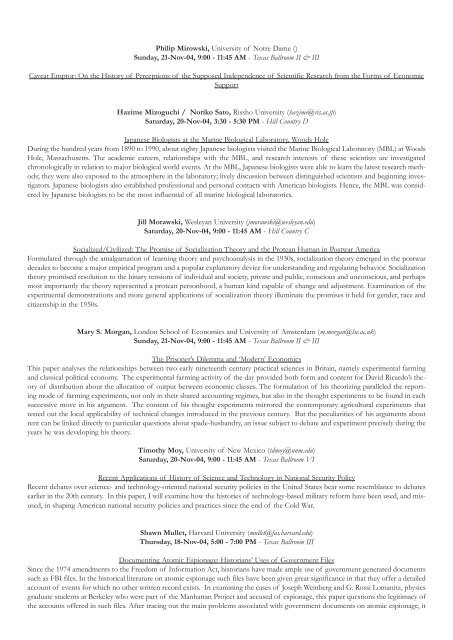Abstracts of the History of Science Society 2004 Austin Meeting 18 ...
Abstracts of the History of Science Society 2004 Austin Meeting 18 ...
Abstracts of the History of Science Society 2004 Austin Meeting 18 ...
Create successful ePaper yourself
Turn your PDF publications into a flip-book with our unique Google optimized e-Paper software.
Philip Mirowski, University <strong>of</strong> Notre Dame ()<br />
Sunday, 21-Nov-04, 9:00 - 11:45 AM - Texas Ballroom II & III<br />
Caveat Emptor: On <strong>the</strong> <strong>History</strong> <strong>of</strong> Perceptions <strong>of</strong> <strong>the</strong> Supposed Independence <strong>of</strong> Scientific Research from <strong>the</strong> Forms <strong>of</strong> Economic<br />
Support<br />
Hazime Mizoguchi / Noriko Sato, Rissho University (hazime@ris.ac.jp)<br />
Saturday, 20-Nov-04, 3:30 - 5:30 PM - Hill Country D<br />
Japanese Biologists at <strong>the</strong> Marine Biological Laboratory, Woods Hole<br />
During <strong>the</strong> hundred years from <strong>18</strong>90 to 1990, about eighty Japanese biologists visited <strong>the</strong> Marine Biological Laboratory (MBL) at Woods<br />
Hole, Massachusetts. The academic careers, relationships with <strong>the</strong> MBL, and research interests <strong>of</strong> <strong>the</strong>se scientists are investigated<br />
chronologically in relation to major biological world events. At <strong>the</strong> MBL, Japanese biologists were able to learn <strong>the</strong> latest research methods;<br />
<strong>the</strong>y were also exposed to <strong>the</strong> atmosphere in <strong>the</strong> laboratory; lively discussion between distinguished scientists and beginning investigators.<br />
Japanese biologists also established pr<strong>of</strong>essional and personal contacts with American biologists. Hence, <strong>the</strong> MBL was considered<br />
by Japanese biologists to be <strong>the</strong> most influential <strong>of</strong> all marine biological laboratories.<br />
Jill Morawski, Wesleyan University (jmorawski@wesleyan.edu)<br />
Saturday, 20-Nov-04, 9:00 - 11:45 AM - Hill Country C<br />
Socialized/Civilized: The Promise <strong>of</strong> Socialization Theory and <strong>the</strong> Protean Human in Postwar America<br />
Formulated through <strong>the</strong> amalgamation <strong>of</strong> learning <strong>the</strong>ory and psychoanalysis in <strong>the</strong> 1930s, socialization <strong>the</strong>ory emerged in <strong>the</strong> postwar<br />
decades to become a major empirical program and a popular explanatory device for understanding and regulating behavior. Socialization<br />
<strong>the</strong>ory promised resolution to <strong>the</strong> binary tensions <strong>of</strong> individual and society, private and public, conscious and unconscious, and perhaps<br />
most importantly <strong>the</strong> <strong>the</strong>ory represented a protean personhood, a human kind capable <strong>of</strong> change and adjustment. Examination <strong>of</strong> <strong>the</strong><br />
experimental demonstrations and more general applications <strong>of</strong> socialization <strong>the</strong>ory illuminate <strong>the</strong> promises it held for gender, race and<br />
citizenship in <strong>the</strong> 1950s.<br />
Mary S. Morgan, London School <strong>of</strong> Economics and University <strong>of</strong> Amsterdam (m.morgan@lse.ac.uk)<br />
Sunday, 21-Nov-04, 9:00 - 11:45 AM - Texas Ballroom II & III<br />
The Prisoner’s Dilemma and ‘Modern’ Economics<br />
This paper analyses <strong>the</strong> relationships between two early nineteenth century practical sciences in Britain, namely experimental farming<br />
and classical political economy. The experimental farming activity <strong>of</strong> <strong>the</strong> day provided both form and content for David Ricardo’s <strong>the</strong>ory<br />
<strong>of</strong> distribution about <strong>the</strong> allocation <strong>of</strong> output between economic classes. The formulation <strong>of</strong> his <strong>the</strong>orizing paralleled <strong>the</strong> reporting<br />
mode <strong>of</strong> farming experiments, not only in <strong>the</strong>ir shared accounting regimes, but also in <strong>the</strong> thought experiments to be found in each<br />
successive move in his argument. The content <strong>of</strong> his thought experiments mirrored <strong>the</strong> contemporary agricultural experiments that<br />
tested out <strong>the</strong> local applicability <strong>of</strong> technical changes introduced in <strong>the</strong> previous century. But <strong>the</strong> peculiarities <strong>of</strong> his arguments about<br />
rent can be linked directly to particular questions about spade-husbandry, an issue subject to debate and experiment precisely during <strong>the</strong><br />
years he was developing his <strong>the</strong>ory.<br />
Timothy Moy, University <strong>of</strong> New Mexico (tdmoy@unm.edu)<br />
Saturday, 20-Nov-04, 9:00 - 11:45 AM - Texas Ballroom VI<br />
Recent Applications <strong>of</strong> <strong>History</strong> <strong>of</strong> <strong>Science</strong> and Technology in National Security Policy<br />
Recent debates over science- and technology-oriented national security policies in <strong>the</strong> United States bear some resemblance to debates<br />
earlier in <strong>the</strong> 20th century. In this paper, I will examine how <strong>the</strong> histories <strong>of</strong> technology-based military reform have been used, and misused,<br />
in shaping American national security policies and practices since <strong>the</strong> end <strong>of</strong> <strong>the</strong> Cold War.<br />
Shawn Mullet, Harvard University (mullet@fas.harvard.edu)<br />
Thursday, <strong>18</strong>-Nov-04, 5:00 - 7:00 PM - Texas Ballroom III<br />
Documenting Atomic Espionage: Historians’ Uses <strong>of</strong> Government Files<br />
Since <strong>the</strong> 1974 amendments to <strong>the</strong> Freedom <strong>of</strong> Information Act, historians have made ample use <strong>of</strong> government generated documents<br />
such as FBI files. In <strong>the</strong> historical literature on atomic espionage such files have been given great significance in that <strong>the</strong>y <strong>of</strong>fer a detailed<br />
account <strong>of</strong> events for which no o<strong>the</strong>r written record exists. In examining <strong>the</strong> cases <strong>of</strong> Joseph Weinberg and G. Rossi Lomanitz, physics<br />
graduate students at Berkeley who were part <strong>of</strong> <strong>the</strong> Manhattan Project and accused <strong>of</strong> espionage, this paper questions <strong>the</strong> legitimacy <strong>of</strong><br />
<strong>the</strong> accounts <strong>of</strong>fered in such files. After tracing out <strong>the</strong> main problems associated with government documents on atomic espionage, it
















